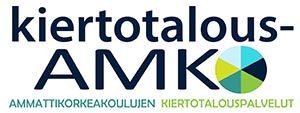Work during 2022-2023 in “Kiertotalous-AMK – Circular economy services in Finnish universities of applied sciences” project.
The vision of the project is to create a national operating model that increases the circular economy together with the Finnish university of applied sciences network. Turku, Lapland and LAB University of Applied Sciences have committed to develop a nationwide network of universities of applied sciences, which aims to offer support especially small and medium-sized companies to develop their operations towards a circular economy. The implementations consider the regional development role of universities of applied sciences, which involves cooperation with various stakeholders (companies, municipalities, cities, business support services, networks). During the project, UASs committed to promoting the circular economy are identified, and the aim is to identify the regional strengths, profiles, and experts of these UASs to serve regional and national development work in the green transition.
The good practices identified in the network are used to increase companies’ awareness and knowledge about circular economy opportunities and different networks. The operation is developed in cooperation with the Kiertotalous-Suomi network and other stakeholders. The funding is provided by Sitra.
Work during 2018-2020 in Circular Economy Competence to Universities of Applied Sciences project.
The project improved the quality and openness of multidisciplinary education at universities of applied sciences by promoting circular economy competence and collaboration with emphasis on international activities. The planning and piloting utilized the philosophy and strategy of Industry 4.0.
Learning environments and methods were developed by utilizing the strengths of the 19 universities of applied sciences participating in the project. The learning environments were tested within the circular economy studies included in different competence areas at universities of applied sciences.
The experiences and best practices of a new kind of cooperation were established as a permanent part of the UAS world. Simultaneously, aspects of circular economy were regularized as part of study plans.
The objectives were to
- improve the quality of education, guidance, teaching and learning,
- increase the selection of studies in circular economy,
- enhance the circular economy competence of higher education institution staff members,
- develop and renew teaching methods,
- develop and pilot learning environments in cooperation with companies,
- increase the international attraction of universities of applied sciences and the export of competence by developing circular economy studies in different languages,
- determine and agree on common operational concepts both between different universities of applied sciences and between companies and universities of applied sciences,
- increase and establish corporate collaboration, openness and cooperation between universities of applied sciences, and interaction between universities of applied sciences and the surrounding society,
- reinforcing the role of students in teaching and competence development, and
- promote circular economy competence in different areas through communications and the development of teaching.
The project was implemented through five work packages. The work package coordinated by Turku University of Applied Sciences investigated which learning environments are used at participating universities of applied sciences, makes proposals to develop them from the viewpoint of circular economy and pilots joint use of these learning environment.
The aim was to have the existing learning environments widely used by educational institutes and companies. In addition, TUAS participated in a work package that develops existing and creates new study modules in circular economy.
